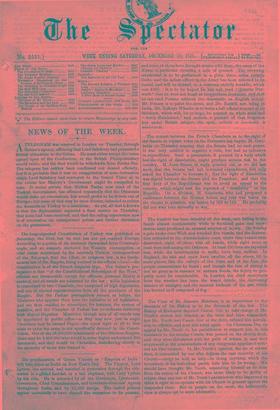The long-expected Constitution of Turkey was published on .Saturday, the
23rd, but its text has not yet reached Europe. According to a précis of its contents forwarded from Constanti- nople, and we suspect, doctored for Western consumption—a vital clime mentioned by the intensely Turkish correspondent of the Telegraph, that the Cheri, or religious law, is the funda- mental law of the Empire, being omitted in the official resume—the Constitution is of the French Imperial type. The Sultan's pre- rogative is that "of the Constitutional Sovereigns of the West," officials are irremovable except for offences, personal liberty is secured, and all creeds are tolerated by the law ; while legislation is committed to two Chambers, one composed of high dignitaries, and one of elected representatives from all the provinces of the Empire. But the Pashas' prerogatives remain as before, the Ministers who appoint them have the initiative in all legiilation, and are thus enabled to stereotype, for instance, the system of taxation, and the Chamber of Pashas has co-ordinate authority with that of Deputies. Moreover, though men of all creeds may be appointed to public office—as they may now, just as negro Christians may be elected Popes—the equal right of all to bear arms or enter the army is not specifically decreed in the Consti- tution. Out of the 28,000,000 inhabitants of the Ottoman Empire, there may be 2,800,000 who would in some degree understand this document, and they would be Christians, disbelieving utterly in the sincerity of those who framed it.


































